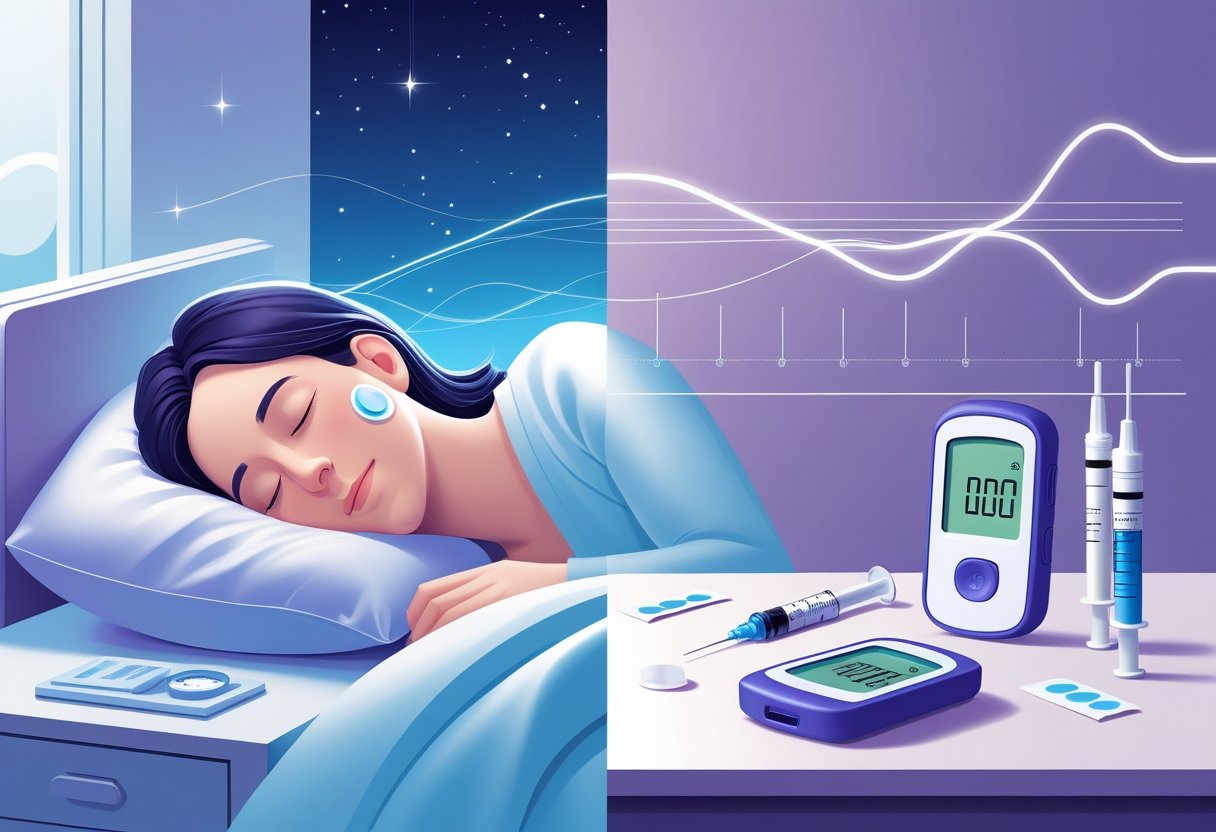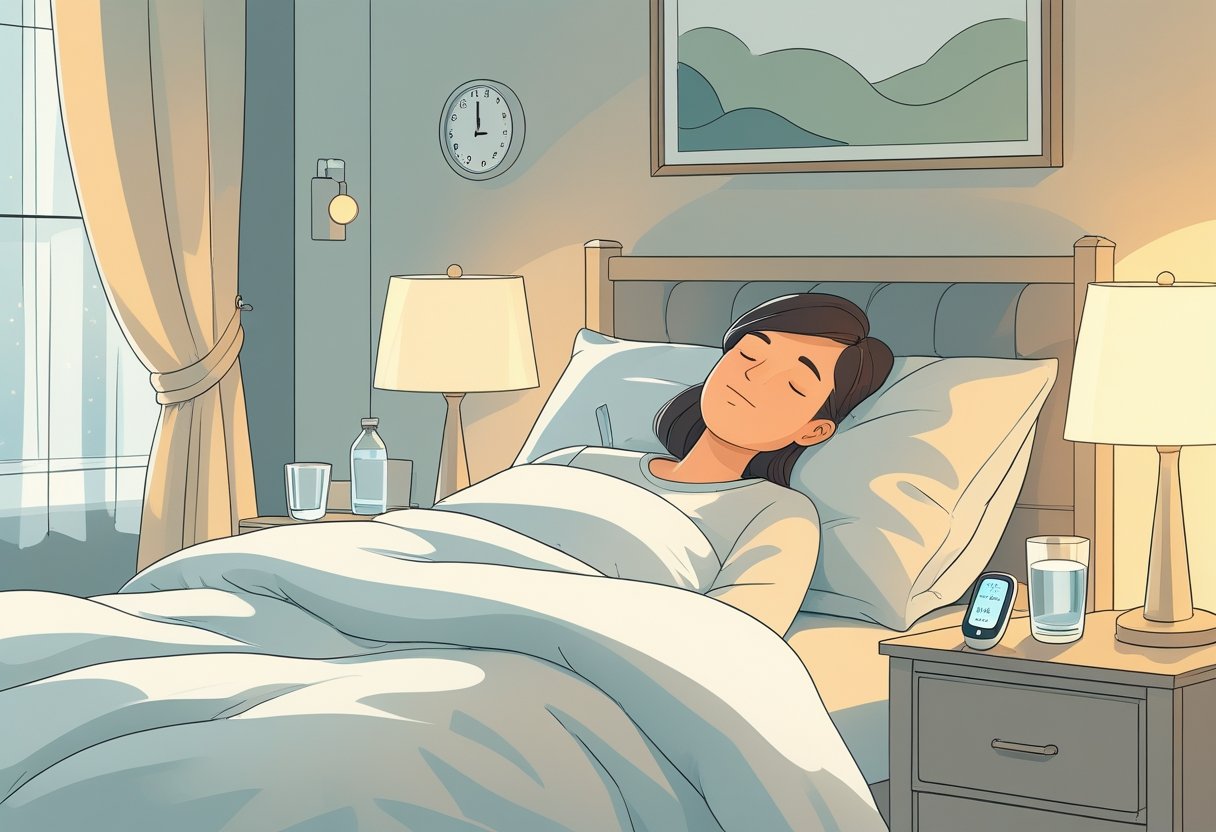Many people with diabetes have trouble sleeping, and poor sleep can make managing the condition harder. When you don’t get enough rest, blood sugar levels can rise, and your body becomes less sensitive to insulin. Over time, this can increase the risk of serious complications.
Sleep problems like sleep apnea, restless legs, and insomnia are common in people with diabetes. High blood sugar may cause frequent bathroom trips, while low blood sugar can cause night sweats or headaches. Both make it tough to stay asleep and feel rested.
Getting better sleep can make blood sugar easier to control and improve overall health. Simple steps like keeping a regular sleep schedule, limiting caffeine, and creating a calm sleep environment can help. And if sleep problems continue, it’s important to talk with a doctor to check for conditions like sleep apnea.
Key Takeaways
- Poor sleep worsens blood sugar control in diabetes.
- Sleep disorders often accompany diabetes.
- Improved sleep habits support better diabetes health.
- A mattress that relieves pressure, controls temperature, and has medium firmness can ease diabetes-related discomfort, improve sleep quality, and help support better blood sugar control.

The Relationship Between Diabetes and Sleep

Diabetes and sleep have a complex connection that can affect overall health. Blood sugar levels, sleep quality, and certain diabetes symptoms all influence this relationship. Understanding these links remains essential for managing both conditions effectively.
How Diabetes Affects Sleep Patterns
People with diabetes face changes in their sleep patterns. Fluctuations in blood sugar may cause nighttime waking or trouble falling asleep. For example, high blood sugar can lead to frequent urination and interrupting rest. Complications from diabetes, such as nerve pain (neuropathy), increase discomfort and make resting difficult. Certain diabetes medications also impact sleep quality.
Sleep disorders like obstructive sleep apnea occur commonly among those with diabetes, which worsens both sleep and overall health. Managing blood sugar levels can reduce these sleep problems, but it might not fully eliminate them.
Bidirectional Impact: Sleep on Blood Glucose Management
Sleep quality influences blood glucose control directly. Poor or insufficient sleep increases insulin resistance, which makes lowering blood sugar more difficult. This creates a cycle where bad sleep worsens diabetes symptoms. Lack of sleep also raises stress hormones that cause blood sugar levels to rise. People with diabetes who sleep poorly may struggle to maintain healthy habits like diet and exercise.
Maintaining good sleep hygiene, including regular sleeping schedules and a calm bedtime routine, improves blood sugar management. Monitoring blood sugar before sleep helps prevent spikes or drops during the night.
Prevalence of Sleep Issues in Diabetic Individuals
Sleep problems are common for people with diabetes. Research shows that around 8 out of 10 people with type 2 diabetes have obstructive sleep apnea. People with type 1 diabetes deal with it too, and almost half of them are affected.
It’s not just sleep apnea. Many also struggle with insomnia, restless legs syndrome, or just poor sleep in general. Extra weight often plays a role here, since obesity is linked to both diabetes and sleep apnea. That makes sleep even harder to manage.
The good news is that treating sleep problems, whether through medical help, weight management, or changes in daily habits, can improve both sleep and blood sugar control. Better sleep makes it easier to handle the ups and downs of diabetes during the day.
Common Sleep Disorders Linked to Diabetes
People with diabetes usually face specific sleep problems because the condition affects their body in several ways. Changes in blood sugar, nerve damage, and breathing difficulties all impact sleep quality and may lead to disorders. Understanding these issues helps improve management of both sleep and diabetes.
Insomnia and Diabetes: Causes and Symptoms
Insomnia commonly affects people with diabetes. High blood sugar levels cause frequent urination, which interrupts sleep. Low blood sugar at night can trigger sweating and sudden waking that makes it difficult to fall back asleep.
Stress and anxiety over managing diabetes also contribute to insomnia. Many with diabetes struggle to fall asleep or wake up too early. This lack of rest worsens blood sugar control and creates a cycle that complicates both insomnia and diabetes.
Symptoms include daytime tiredness, trouble concentrating, and irritability. Controlling blood sugar and managing stress can help reduce insomnia in those with diabetes.
Obstructive Sleep Apnea in People With Diabetes
Obstructive sleep apnea (OSA) happens when breathing briefly stops during sleep because airways become blocked. At least half of people with type 2 diabetes have OSA, which worsens insulin resistance and blood sugar control. Obesity, a common risk factor for both OSA and diabetes, raises the chances of airway blockage. Symptoms include loud snoring, gasping for air, and excessive daytime sleepiness.
Untreated OSA increases the risk of heart problems and diabetes complications. Diagnosing and treating sleep apnea with devices like CPAP machines can improve sleep quality and diabetes management.
Restless Legs Syndrome and Neuropathy
Restless legs syndrome (RLS) causes uncomfortable sensations and urges to move the legs, mostly at night. People with diabetes have a higher risk of developing RLS, especially if diabetic neuropathy is present. Neuropathy damages nerves and leads to pain, tingling, or numbness, which can worsen RLS symptoms. This combination makes falling asleep and staying asleep difficult.
Treatment focuses on managing nerve pain and improving blood sugar control. Addressing RLS in diabetes matters because poor sleep affects overall health and blood sugar levels.

Consequences of Poor Sleep in Diabetes
Poor sleep impacts many aspects of health for people with diabetes. It makes blood sugar harder to control and raises risks during daily activities. These issues contribute to more serious health problems and lower overall quality of life.
Lack of Sleep and Blood Sugar Control
Sleep regulates many bodily processes, including blood sugar levels. When people with diabetes fail to get enough rest, managing their blood sugar becomes more difficult. This occurs because poor sleep lowers insulin sensitivity, meaning the body does not use insulin effectively.
Higher blood sugar levels, measured by HbA1c, frequently appear in those experiencing insufficient or poor-quality sleep. Over time, this worsens diabetes complications. Practicing good sleep hygiene helps reduce these effects and supports better blood sugar control.
Research shows that individuals with type 2 diabetes who face sleep difficulties tend to have unstable blood sugar, which increases the risk of serious conditions such as heart disease and nerve damage. Improving sleep can enhance blood sugar management.
Risks of Daytime Sleepiness and Falling Asleep at Work
Excessive daytime sleepiness often affects people with diabetes who struggle with sleep. This creates safety concerns, particularly at work. Falling asleep on the job lowers productivity and raises the risk of accidents.
Fluctuations in blood sugar and complications like neuropathy may cause greater fatigue during the day. This tiredness leads to trouble concentrating and poor decision-making, which impacts job performance.

Sleep Recommendations for People With Diabetes
Good sleep helps in managing diabetes. It supports blood sugar control and contributes to overall health. Getting enough rest while maintaining healthy sleep habits can lower the risk of complications such as insulin resistance and sleep apnea.
How Many Hours Should a Diabetic Sleep?
Most adults with diabetes need 7 to 9 hours of sleep each night. Sleeping fewer than 6 hours or more than 9 may disrupt blood sugar control and raise the risk of other health problems. Too little sleep can cause spikes in blood glucose and may lead to insulin resistance. On the other hand, oversleeping may signal poor diabetes management or other underlying health concerns.
A consistent sleep schedule is also important. Going to bed and waking up at the same time every day helps stabilize hormone levels and makes it easier to manage glucose.
Ideal Sleep Hygiene Practices
Good sleep hygiene helps people with diabetes get better rest. A few essential habits include:
- Stick to a routine: Go to bed and wake up at the same time every day.
- Create a relaxing bedtime ritual: Stay away from screens and stressful tasks before bed.
- Optimize your sleep setting: Keep the room dark, cool, and quiet.
- Limit caffeine and large meals: Avoid these at least 3 to 4 hours before bed.
- Stay active during the day: Regular physical activity supports better sleep at night.
It’s also important to avoid nicotine and alcohol before bedtime, as they can interfere with deep sleep. Following these habits improves insulin sensitivity and helps regulate blood sugar more effectively.

Managing Sleep Disturbances for Better Diabetes Outcomes

Improving sleep quality helps regulate blood sugar levels and lowers the risk of diabetes-related complications. Making daily adjustments and knowing when to seek medical advice are essential for managing sleep issues tied to diabetes.
Lifestyle Modifications to Improve Sleep
People with diabetes benefit from following a consistent sleep schedule. Going to bed and waking up at the same time each day helps regulate the body’s internal clock.
Caffeine and heavy meals late in the evening interfere with sleep, so it’s best to avoid them. Light daytime exercise promotes restful sleep, although it shouldn’t take place too close to bedtime. A calm sleep environment also makes a difference. Keeping the bedroom cool and dark while limiting screen time before bed helps the body wind down. Relaxation methods such as deep breathing or meditation ease stress, which can otherwise disrupt sleep.
When to Seek Medical Advice
If sleep issues continue despite lifestyle efforts, medical guidance becomes necessary. Watch for signs like loud snoring, breathing interruptions during sleep, or feeling excessively tired during the day.
People with diabetes who show symptoms of obstructive sleep apnea (OSA) should consult their doctor. Since OSA interferes with blood sugar control, it needs timely treatment. A doctor might recommend a sleep specialist for further evaluation, including a sleep study.
Treatment options include CPAP machines or prescribed medications, both of which can improve sleep and support better diabetes management.
Emerging Research and Future Directions
Doctors have known for years that food and exercise play big roles in diabetes care. Now research shows sleep is just as important. Poor sleep, whether not enough hours or low-quality rest, can make it harder to manage blood sugar. On the other hand, getting better deep sleep may actually help improve glucose control.
One study found that people with type 2 diabetes who spent more time in slow-wave sleep (deep sleep) had better blood sugar regulation. This suggests that targeting sleep health could become part of diabetes treatment, not just diet and medication.
Technology is giving both patients and doctors new ways to look at sleep. Devices like CPAP machines, often used for sleep apnea, not only keep breathing steady but also track sleep patterns. Some wearables and home monitors can also measure sleep duration and quality. And for someone with diabetes, this data is valuable. It helps doctors see how sleep problems connect with blood sugar swings. Over time, tracking this information could make care more personalized and effective.

How the Right Mattress Supports Better Sleep for People with Diabetes
People with diabetes struggle with sleep due to symptoms like nerve pain, unstable blood sugar, and restless legs. The right mattress can ease discomfort and support deeper and more restorative sleep.
A mattress that relieves pressure points is essential. Memory foam or latex options can achieve this by molding to the body’s shape. This relief can reduce nerve pain and improve circulation, both crucial for diabetic sleepers. A balanced choice like the Amerisleep AS3 provides such support by combining contouring comfort with targeted pressure relief.
Temperature control matters just as much. Many diabetics deal with night sweats or heat sensitivity. A mattress with cooling features or breathable materials helps maintain a steady, comfortable temperature through the night. That means fewer wake-ups and more stable blood sugar.
Key mattress features for people with diabetes:
- Pressure relief – Helps ease nerve pain and reduce pressure buildup
- Cooling materials – Keeps the body from overheating during sleep
- Medium firmness – Supports joints while avoiding too much sink
- Motion isolation – Limits movement from a partner that could disturb sleep
Proper spinal alignment also helps. Some mattresses support the back and joints in a way that prevents aches from interfering with rest. For added comfort, certain mattresses have a “cool side” that can be flipped depending on the season.
The Amerisleep AS3 stands out by meeting several needs of diabetic sleepers. Its medium firmness suits most sleep positions, while the plant-based Bio-Pur foam is breathable and responsive through the night. It also isolates motion effectively, which can help avoid disruptions if sharing the bed.

Frequently Asked Questions
Getting the right amount and quality of sleep is important in managing diabetes. Poor sleep raises blood sugar levels and increases the risk of complications. Several sleep problems occur frequently in people with diabetes and may require special attention.







